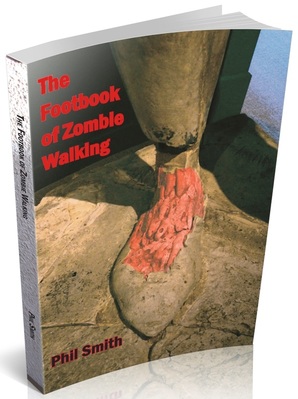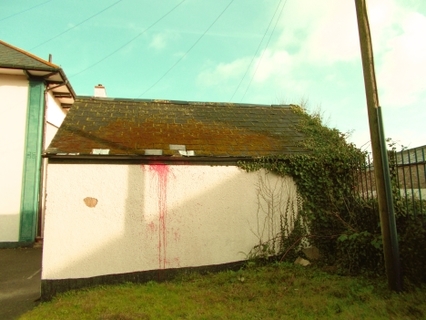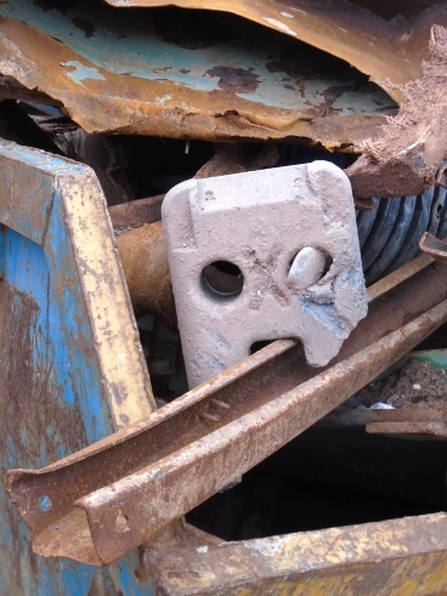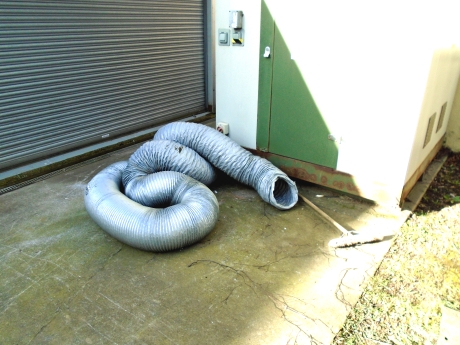|
Chris Lambert writes on Amazon:
"Phil Smith (aka Crab Man) used to walk sideways. Now he stumbles, shambles and groans. In his fantastic book Counter-Tourism: The Handbook he encourages us to see the world in a new way, to re-view the familiar through our own mischief, to play with established sites, to usurp the rules set by the heritage industry and question the geographic and historic hegemony. He enables us to recognise that history and our expectations of landscape are a construct and that we would have much more fun if we fabricated our own. Above all Phil Smith encourages us to play again, (in the case of some atrophied readers he may be encouraging us to play for the first time) to rip up our guide books and write a new narrative over the landscape. He encourages us to slip into liminal spaces, explore boundaries, discover that the most interesting places are often the least visited. In his dérives he has uncovered ways of enjoying the world anew. There is something distinctly spiritual about his books. Phil Smith encourages us to re-engage with an environment we mostly ignore. Since reading Counter Tourism and On Walking I often find myself contemplating the pleasures of getting lost. Leaving the path or the motorway and exploring unknown spaces. I enjoy finding out facts and folklore about unfamiliar locales and revel in lying about overly familiar places. These experiences are akin to laying a transparency of magic over the landscape. With his new book The Footbook of Zombie Walking his approach has evolved further. The journey through the landscape is explored through the myth and tropes of the Zombie. But rather than this being an exploration of elaborate Zombie role play (which I was expecting) it becomes something far more eye-opening, spiritual and ultimately moving. The book uses a structure that those of us familiar with Phil Smith’s work will recognise: observation, italicised records of discoveries, suggestions for exercises to enhance your dérives and academic cross-referencing between discoveries on the walk and his own extensive knowledge. However, owing to the focus of the book being on the Zombie, it delves into very strange and enlightening territory. For some, Zombie movies are revolting excesses of gore and violence, they appear repetitive and often cheap, they revel in death and decay, and they celebrate the post-apocalyptic life. For others the films appeal for the exact same reasons. The Zombie film is about rebirth. The rebirth of the landscape, the body and the mind. It is this notion of starting again - of our overly familiar environment becoming a brand new place of unexpected possibility – of our own minds and bodies being agents and vessels of this change - that appeals to us. Walking and Zombies might not seem well-matched bedfellows but on reading this book I am surprised that this has not been covered before. The majority of Zombie films contain more walking and landscape than Peter Jackson’s Hobbit and Lord of the Rings trilogies combined. Zombies can only walk and the survivors, with defunct technology all around them, are forced to do the same. The Zombies see a world full of possibility and food and the survivors see a ravaged shell, full of danger. Both parties are invigorated and changed by the transformation of their world. Phil Smith enables us to see our own world through these eyes. I am a Zombie Apologist. (I have become recently acquainted with the term “apologist” when I discovered that there is a sub-genre of religious literature known as Christian Apologetics – these books are written to appeal to non-Christians who view the violent excesses of religion with suspicion. The Christian Apologist edits or re-interprets the nastier bits of religion to make it more palatable to the liberal, anti-slavery, sexually tolerant post millennials. It therefore seems an apt modifier to use next to “Zombie”.) When speaking to those who think of undead film and literature in the same way that I consider football (i.e. not at all) I find myself avoiding the Zombie in my explanations. This is similar to the way that football aficionados try to win me over with talk of atmosphere and camaraderie to get me to watch a match whilst avoiding mention of the game itself. I find myself talking of survival, metaphors and “It’s about family really.” A classic defence of “The Walking Dead”, when met with “Hasn’t that got Zombies in it?” is “Yeah, but it’s not really about Zombies.” The Zombie cockerel has crowed three times. Not only does Phil Smith reveal this to be an utterly cowardly riposte he also encourages us to embrace the Zombie in our lives and perambulations. Phil Smith is less Zombie Apologist and more Zombie Evangelist. Zombie films are about transformation. Primarily two things are transformed: the body and the landscape. The book acts as a guide to how we can engage with landscape, community and our own selves in a different way. The Zombie’s shambling gait is a portal to new experiences and ways of seeing. The Footbook of Zombie Walking revises our view of the Zombie, but, strangely and movingly for such a fearful and stupid creature, it allows the Zombie to guide us into a new way of living. This is Zen and the Art of Motorcycle Maintenance for the post-millennial generation – we can find enlightenment through the Zombie in much the same way that Pirsig finds it through embracing the mechanical. This fascinating book does require some knowledge of Zombie films due to the myriad references made throughout, I would suggest as primer material that you read The Walking Dead graphic novels by Robert Kirkman, and The Road by Cormac McCarthy. Watch Night of the Living Dead (both the original and the 90’s remake), Dawn of the Dead (both versions), Day of the Dead (the original), Les Revenants, Shaun of the Dead and see where that takes you. Embrace your inner Zombie and see the world anew. Seek it out. Consume. Stumble. Groan. See the familiar as though it is new." Theresa Turner:
"I do have to mention here a book by Dr Phil Smith: “The Footbook of Zombie Walking”. It recommends walking through the world as though a slow apocalypse is occurring and there might be a zombie around every corner. It changes things: life is suddenly full of possibilities. If there’s a zombie around the next corner, there might be a politician ready to really welcome refugees or reverse all the Pay As You Go decisions about university education. It’s very uplifting for a book about the apocalypse." Read the full review |
The Footbook of Zombie Walking - REVIEWS
“this is a very fine book and I recommend it to everyone with an interest in walking-philosophy” ~ Ewan Morrison
Richard Bleiler writing in Dead Reckonings No. 19/20 Fall 2016
“What it is, really, is a series of chapters that discuss aspects of zombies in their various depictions, with questions and suggestions for the readers interspersed. If one is attuned to this sort of thing, such passages as this – Shinji Mikami, the originator of the ‘Resident Evil’ computer game dubbed the sub-genre ‘Survival Horror’. As Slavoj Žižek has it, ‘the obscene immortality of the ‘living dead’ which, after every annihilation, recompose themselves and clumsily go on... an uncanny urge to repeat painful past experiences that seems to outgrow the natural limitations of the organism affected by it and to insist even beyond the organism’s death’ (ellipsis in the original) – will stimulate thought.” The review then challenges a number of the author's assumptions and berates the book for its amateurish cover, incomplete bibliography and lack of an index. It continues: “Nevertheless, it must be emphasized that these comments are not meant to dismiss or disparage Footbook, for it offers much that can be savored and enjoyed. Smith is well-informed and clearly loves his subject, and his exercises and suggestions can be stimulating. In addition,many of Smith's theoretical, zombie-centric discussions are quite lively. ... Smith takes what already exists and does something very clever with it, creating an original amalgamation.” "It’s easier to think of the end of the world as we know it in terms of a zombie apocalypse than, say, the effects of global warming, a nuclear error, a mutant strain of influenza - or Ebola - or the Third World War.
I mean, zombies aren’t real. In those terms, a global apocalypse is just fantasy. We can scare ourselves silly watching horror films, knowing that the world out there isn’t over-run by shambling undead out to eat our brains and turn us into the thing we fear. Except that the world isn’t safe, is it? We only have to turn on the telly to see that all over the globe people are seeing the world they know end. Survivors flee from war zones, are made homeless by rising tides, see their loved ones killed in famines and epidemics. And terrorist attacks make us look at those around us with suspicion – are they like us or are they the other, the threat that will destroy us? It isn’t surprising that the zombie genre in horror films, books, comics, games and performance art has become so popular over the past few decades. We need that safe, fantasy way to explore how to behave in the face of a real world apocalypse that might be just around the corner; that might even be here already... A new book by Phil Smith aims to take us just a little further along that path of exploration. It is called The Footbook of Zombie Walking: How to be More Than a Survivor in an Apocalypse. ... As well as offering a critique and analysis of the themes and plots in a huge range of zombie films and fiction, he describes ways of going outside and interacting with the landscape by viewing it as if we were in such a plot. The easiest way is to simply imagine you are a survivor. I tried this on my regular commute to work on a weekday morning. I looked around at my fellow travellers. Trust me, most of them were zombies. It was scary. From there you can, of course, explore being a zombie, but you can go further still. Zombie walking can become a sort of meditation or form of mindfulness. It can be liberating and consciousness changing. It can show us how to face our fears which, as many spiritual and magical paths teach, is the best way to overcome them." Read the full review by the BadWitch Music for Zombies:
"The journey through the landscape is explored through the myth and tropes of the Zombie. But rather than this being an exploration of elaborate Zombie role play (which I was expecting) it becomes something far more eye-opening, spiritual and ultimately moving. The book uses a structure that those of us familiar with Phil Smith’s work will recognise: observation, italicised records of discoveries, suggestions for exercises to enhance your dérives and academic cross-referencing between discoveries on the walk and his own extensive knowledge. However, owing to the focus of the book being on the Zombie, it delves into very strange and enlightening territory. For some, Zombie movies are revolting excesses of gore and violence, they appear repetitive and often cheap, they revel in death and decay, and they celebrate the post-apocalyptic life. For others the films appeal for the exact same reasons. The Zombie film is about rebirth. The rebirth of the landscape, the body and the mind. It is this notion of starting again - of our overly familiar environment becoming a brand new place of unexpected possibility – of our own minds and bodies being agents and vessels of this change - that appeals to us. Walking and Zombies might not seem well-matched bedfellows but on reading this book I am surprised that this has not been covered before. The majority of Zombie films contain more walking and landscape than Peter Jackson’s Hobbit and Lord of the Rings trilogies combined. Zombies can only walk and the survivors, with defunct technology all around them, are forced to do the same. The Zombies see a world full of possibility and food and the survivors see a ravaged shell, full of danger. Both parties are invigorated and changed by the transformation of their world. Phil Smith enables us to see our own world through these eyes. ... Zombie films are about transformation. Primarily two things are transformed: the body and the landscape. The book acts as a guide to how we can engage with landscape, community and our own selves in a different way. The Zombie’s shambling gait is a portal to new experiences and ways of seeing. The Footbook of Zombie Walking revises our view of the Zombie, but, strangely and movingly for such a fearful and stupid creature, it allows the Zombie to guide us into a new way of living. This is Zen and the Art of Motorcycle Maintenance for the post-millennial generation – we can find enlightenment through the Zombie in much the same way that Pirsig finds it through embracing the mechanical. ...Embrace your inner Zombie and see the world anew. Seek it out. Consume. Stumble. Groan. See the familiar as though it is new." Read the full review |




